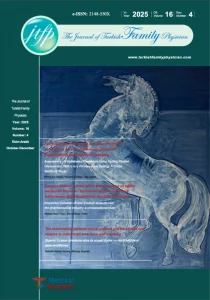Evaluation of knowledge and attitude of intern physicians about rational druge use and druge interactions
Objectives: In this study, we aimed to examine the know-ledge, attitudes and behaviors of intern physicians about rational drug use and drug interactions and to increase their awareness.
Materials and Methods: Data; the “physician evaluation questionnaire” and the “drug interactions knowledge level questionnaire” with the choice of true, false and I have no idea consisting of 20 correct statements prepared by the researcher were collected online.
Results: 180 students participated in the study. 59 % of the participants were female and the mean age was 23,71± 0,72. Participants stated that their level of knowledge about drugs, drug interactions and bioequivalence was low. While taking the patient’s history; they questioned vitamin, food supplements (16,7 %; n = 30) and herbal medicine (22,2 %; n = 40) at least. The rate of those who wanted to receive training on rational drug use before graduation was 92,2 % (n = 166). The correct number of answers given to the drug interactions questionnaire is average 6,76 ± 5,57, wrong number avg. 1,29 ± 2,14, I have no idea number average. It was 11,86 ± 6,28. According to the survey, the knowledge level of physicians on drug interactions was very low (Crohnbach alpha value of 0,92). The mean number of false and no ıdea answers was significantly higher in those who received rational drug education (p = 0,027, p = 0,028).
Conclusion: The formation of rational drug use awareness and the development of educational opportunities for the expansion of educational content and timing is required to be updated dynamically.
References
- WHO. The rational use of drugs: report of the conference of experts, Nairobi, 25-29 November 1985.
- Albany NY, WHO Publications Center USA [distributor]; 1987. WHO. Promoting rational use of medicines: core components. World Health Organization; 2002. https://apps.who.int/iris/handle/10665/67438 adresinden 18.11.2020 tarihinde erişilmiştir.
- Akıcı A, Uğurlu MÜ, Gönüllü N, Oktay Ş, Kalaça S. Pratisyen hekimlerin akılcı ilaç kullanımı konusunda bilgi ve tutumlarının değerlendirilmesi. Sted 2002;11(7):253-7.
- Askari M, Eslami S, Louws M, et al. Frequency and nature of drug-drug interactions in the intensive care unit. Pharmacoepidemiology and drug safety 2013;22(4):430-7.
- Rekić D, Reynolds KS, Zhao P, et al. Clinical Drug–Drug interaction evaluations to inform drug use and enable drug access. Journal of pharmaceutical sciences 2017;106(9):2214-8.
- Businaro R. Why we need an efficient and careful pharma-covigilance? Journal of pharmacovigilance 2013;1:4.
- Vonbach P, Dubied A, Krähenbühl S, Beer JH. Evaluation of frequently used drug interaction screening programs. Pharmacy world & science 2008;30(4):367-74.
- Health Do, Care S. The Report of the Short Life Working Group on reducing medication-related harm. DHSC London; 2018. https://assets.publishing.service.gov.uk/government/uploads/ system/uploads/ attachment_data/file /683430/short-life-working-group-report-on-medication-errors.pdf adresinden 18.11.2020 tarihinde erişilmiştir.
- Açıkgöz A, Çehreli R, Ellidokuz H. Kadınların kanser konusunda bilgi ve tutumları ile erken tanı yöntemlerine yönelik davranışları. Dokuz Eylül Üniversitesi Tıp Fakültesi Dergisi 2011;25(3):145-54.
- Maxwell SR, Cascorbi I, Orme M, Webb DJ, Prescribing JBEWGoS. Educating European (junior) doctors for safe prescribing. Basic & clinical pharmacology & toxicology 2007;101(6):395-400.
- Cangir A. Akılcı ilaç kullanımı: Batman ili merkez ilçesinde çalışan aile hekimlerinin akılcı ilaç kullanımı konusundaki bilgi ve tutumlarının değerlendirilmesi. 2019. https://katalog.marmara.edu.tr/veriler/yordambt/cokluortam/FFCE7931-5C7D-7C42-8411-A5A8DD8D4626/5d38238c19b58.pdf adresinden 08.11.2020 tarihinde erişilmiştir.
- Van Leeuwen R, Brundel D, Neef C, et al. Prevalence of potential drug–drug interactions in cancer patients treated with oral anticancer drugs. British journal of cancer 2013;108(5):1071-8.
- Hocaoğlu N, Güven H, Gidener S, Kalkan Ş, Gümüştekin M, Gelal A. Dokuz Eylül Üniversitesi Tıp Fakültesi dördüncü sınıf öğrencilerinin akılcı ilaç kullanım becerileri üzerine akılcı ilaç kullanım kursunun kısa dönem etkileri. Dokuz Eylül Üniversitesi Tıp Fakültesi Dergisi 2011;25(1):15-24.
- Akici A, Gören MZ, Aypak C, Terzioğlu B, Oktay Ş. Prescription audit adjunct to rational pharmacotherapy education improves prescribing skills of medical students. European journal of clinical pharmacology 2005;61(9):643-50.
- Guney Z, Uluoglu C, Yucel B, Coskun O. The impact of rational pharmacotherapy training reinforced via prescription audit on the prescribing skills of fifth-year medical students. International journal of clinical pharmacology and therapeutics 2009;47(11):671-8.
- Sılan C. Dönem IV ve V öğrencilerine uygulanan akılcı ilaç seçimi ve kullanımı eğitimine ilişkin 6 yıllık sonuçlar. 21. Ulusal Farmakoloji Kongresi Kongre Kitabı 2011;378.
- Akici A, Kalaça S, Ugurlu MÜ, Karaalp A, Çali Ş, Oktay Ş. Impact of a short postgraduate course in rational pharmacotherapy for general practitioners. British journal of clinical pharmacology 2004;57(3):310-21.
- Demirkıran M, Şahin B. Pratisyen hekimlerin ilaç seçimlerini etkileyen faktörlere ilişkin değerlendirmeleri. Hacettepe Sağlık İdaresi Dergisi 2010;13(1):1-28.
- Peköz Ö. Araştırma Görevlilerinin Akılcı İlaç Kullanımına Yönelik Tutum Ve Davranışları. 26-30 Eylül 2018, Güz Okulu Sözel Bildiri. TAHEV Elektronik Kitap; 2018:100.
- Akkurt B. Araştırma görevlilerinin (branş) akılcı ilaç kullanımı konusunda bilgi tutum ve davranışları, T.C Sağlik Bakanliği Yıldırım Beyazıt Ünİversitesİ Tıp Fakültesi Aile Hekimliği Anabilim Dalı yayımlanmamış uzmanlık tezi, 2016.
- Bilge U, Ünlüoğlu İ. Aile Hekimliğinde akılcı ilaç kullanımı. In: Aile Hekimliğinde Akılcı İlaç Kullanımı. İstanbul, Tahev Yayınları No:7; 2019.
- Vançelik S, Çalıkoğlu O, Güraksın A, Beyhun E. Pratisyen hekimlerin reçete yazımını şekillendiren faktörler ve akılcı ilaç kullanım kriterlerini önemseme durumları. Hacettepe Üniversitesi Eczacılık Fakültesi Dergisi 2006(2):65-76.
- Mollahaliloğlu S. Ankara il Merkezinde bulunan sağlık ocaklarında yazılan reçetelerin değerlendirilmesi. Hacettepe Üniversitesi Tıp Fakültesi Bilim Uzmanlığı Tezi, 2000.
- Prosser H, Almond S, Walley T. Influences on GPs’ decision to prescribe new drugs—the importance of who says what. Family practice 2003;20(1):61-8.
- Burton B, Rowell A. Unhealthy spin. Bmj 2003;326(7400):1205-7.



